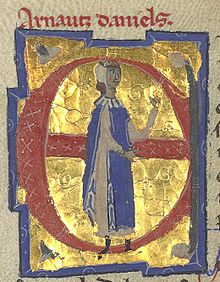Arnaut Daniel
Occitan troubadour
Arnaut Daniel was a Provençal troubadour of the late 12th or early 13th century. He was a major influence on Dante.

Quotes
edit- E si tot venta'ill freg'aura,
L'amor qu'ins el cor mi pleu
Mi ten caut on plus iverna.- And even if the cold wind blows,
The love that rains in my heart
Keeps me the warmer the colder it is. - "Ab gai so cundet e leri", line 12; translation by Leonardo Malcovati [1]
- And even if the cold wind blows,
- Ieu sui Arnautz qu'amas l'aura
E cas la lebre ab lo bueu
E nadi contra suberna.- I am Arnaut who love the wind,
And chase the hare with the ox,
And swim against the torrent. - "Ab gai so cundet e leri", line 43; translation from Ezra Pound The Spirit of Romance (1910) p. 30.
- I am Arnaut who love the wind,
- En breu brizara'l temps braus
E'l biza, e'l brus e'l blancx
Qui s'entresenhon trastuig
De sobre claus ram de fuelha.- Briefly bursteth season brisk,
Blasty north breeze racketh branch,
Branches rasp each branch on each
Tearing twig and tearing leafage. - "En breu brizara'l temps braus", line 1; translation from Ezra Pound Instigations (1920) p. 309.
- Briefly bursteth season brisk,
Criticism
edit- "O frate," disse, "chesti qu'io ti cerno
col ditto," e additò un spirto innanzi,
"fu miglior fabbro del parlar materno.
Versi d'amore e prose di romanzi
soverchiò tutti; e lascia dir li stolti
che quel di Lemosì credon ch'avanzi.- "O brother," said he, "He who is singled by
My finger (he pointed to a spirit in front)
Wrought better in the mother-tongue than I.
Whether in verses of love or prose romaunt
He surpassed all; and let the fools contend
Who make him of Limoges of more account. - Dante Purgatorio, canto 26, line 115; translation by Laurence Binyon, in Dante's Purgatorio (1938) p. 309.
- "O brother," said he, "He who is singled by
- Fra tutti il primo Arnaldo Danïello
Gran maestro d'amor; ch'a la sua terra
Ancor fa onor col suo dir strano e bello.